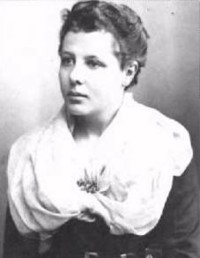Lifetime
Born: 1847Passed away: 1933
About
Annie Besant (née Wood; Clapham, London 1 October 1847 – 20 September 1933 in Adyar, India) was a prominent Theosophist, women's rights activist, writer and orator and supporter of Irish and Indian self rule.
- She was married at 19 to Frank Besant but separated from him over religious differences. Moving to London, she became a prominent speaker for the National Secular Society and writer and a close friend of Charles Bradlaugh. In 1877 they were prosecuted for publishing a book by birth control campaigner Charles Knowlton. The scandal made them famous and Bradlaugh was elected MP for Northampton in 1880.
- Annie became involved with Union organisers including the Bloody Sunday demonstration and the London matchgirls strike of 1888 and a leading speaker for the Fabian Society and the (Marxist) Social Democratic Federation and was elected to the London School Board for Tower Hamlets, topping the poll even though few women were qualified to vote at that time.
- In 1890 Annie Besant met Helena Blavatsky and over the next few years her interest in Theosophy grew and her interest in left wing politics waned. She travelled to India and in 1898 helped establish the Central Hindu College in India.
- In 1902 she established the International Order of Co-Freemasonry in England and over the next few years established lodges in many parts of the British Empire.
- In 1908 Annie Besant became President of the Theosophical Society and began to steer the society away from Buddhism and towards Hinduism. She also became involved in politics in India, joining the Indian National Congress. When war broke out in Europe in 1914 she helped launch the Home Rule League to campaign for democracy in India and dominion status within the Empire which culminated in her election as president of the India National Congress in late 1917. After the war she continued to campaign for Indian independence until her death in 1933.
